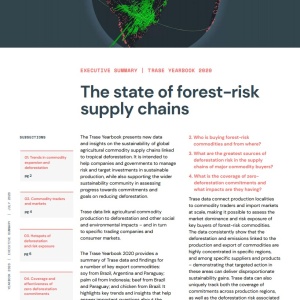
Trase - a partnership between the Stockholm Environment Institute and Global Canopy - has published its 2020 yearbook, which reviews deforestation in supply chains for commodities such as soy, beef, chicken and palm oil and examines the effectiveness of zero-deforestation commitments.
The report shows that in 2018 the expansion of pasture was responsible for 81% of deforestation in the Brazilian Amazon, over 95% of the deforestation in the Paraguayan Chaco, and 54% in the Cerrado. Expansion of cropland for soy cultivation often takes place on former pasture, suggesting that soy may indirectly drive deforestation through displacing cattle pasture.
The report also finds that more than half of the risk of deforestation from traded commodities originates from less than 5% of production localities, such as Matopiba, the main deforestation frontier in the Brazilian Cerrado.
Read the full report, Trase Yearbook 2020: The state of forest-risk supply chains, here. See also the Foodsource building block Soy: food, feed, and land use change.







Post a new comment »